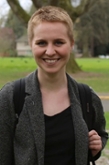
Sasha Peters '15
As reported in the March 17, 2015 Oregonian:
By Richard Read
Two Reed College seniors have won tickets to their dreams, Thomas J. Watson Fellowships that give recipients a paid year to follow their passions to the ends of the Earth.
Rennie Meyers, an environmental studies and history major from New York, will study the formation of artificial coral reefs and fish habitat in the Canary Islands, Fiji, Brunei and Japan.
Sasha Peters, a history and literature major from California, will explore abandoned Soviet sites and cities in Latvia, the Czech Republic, Poland, Norway, Bulgaria and Germany.
The fellowships, named for a former IBM chairman, send 50 college graduates abroad each year with $30,000 stipends on research projects they have proposed, the more original and exotic the better. Reed students have won 67 Watson Fellowships since the program began in 1968.
"I'm pretty terrified, but also pretty excited," Peters said. Her most challenging destination is an abandoned coal mine on an island two hours by plane from Oslo, accessible in winter by snowmobile.
By contrast, Meyers will spend her year in subtropical warmth. "We're a little daunted," she said, "but that's part of the whole kit and caboodle."
Josh Howe, an assistant professor of history and environmental studies who advises both students, said the naming of two fellows is a breakthrough for Reed after several years of few awards. The most recent Reedie to receive a Watson was Cole Perkinson '13, who went to Africa to research Zimbabwean music.
"We're excited to have Watson back on the map at Reed," Howe said. "I'm thrilled about it."
As an undergraduate, Howe applied for the fellowship but didn't get nominated by his college. He wanted to study tourism and culture in a variety of mountain communities in different parts of the world.
"My proposal was pretty half-baked," Howe said. "I didn't quite have the vision that Sasha and Rennie and our other applicants have."
The Watson Foundation's newly revamped Web site says fellows must have leadership, imagination, independence, emotional maturity, courage, integrity, resourcefulness and responsibility.
"The candidates just have to be really dynamic, interesting individuals who exude a curiosity and confidence about the world that's going to enable them to actually do these things," Howe said. "Sasha and Rennie have got that in spades."
Reed, one of 40 colleges eligible to nominate applicants, is a natural for the program, given its reputation for seeking and encouraging free thinking and originality, said Chris Kasabach, executive director of the New York-based Watson Foundation. He said the best applications are ones that only the applicants could have written.
"So if you have a school that's promoting the organic interests and skills of an individual, you're going to have great Watson applications," Kasabach said. He is a former Watson fellow who spent his year in Africa and South America.
The fellowship and graduates' projects may sound far out, but Kasabach said the program's goal is "to expand the vision and develop the potential of these remarkable students." The intent, he said, is "to increase their confidence and their perspectives so they can achieve their own goals and help others achieve theirs."
Competition was stiff this year. Almost 700 students applied. Select private liberal-arts colleges and universities nominated 150, from which the foundation chose 50.
Peters, who speaks Russian, is writing her senior thesis on the connection between Soviet environmental history and Russian nationalism, as reflected in literature. She plans to explore abandoned Soviet sites through the medium of radio.
One challenge will be that many of the sites are ghost towns, so finding people to talk about them could be difficult.
Peters plans to visit former military bases, a partially abandoned industrial block in Germany and an empty amphitheater in Bulgaria featuring an auditorium with a hammer and sickle displayed on its ceiling. Another destination is a former radar station in Latvia.
"I'm not even sure if I can get into some of these places," Peters said. "I'm trying to figure out what it means for a Soviet project to loom over these places that otherwise weren't Soviet."
Meyers is writing her senior thesis on the development of marine ecology in Monterey Bay from the 1880s to the 1970s. While at Reed, she got a dive-master certification that will prove handy as she explores artificial coral reefs.
In Brunei, Meyers will get an up-close view of a politically controversial "Rigs to Reefs" program, in which petroleum companies support the conversion of abandoned oil rigs into coral-reef substrate.
In Fiji, she'll see how local communities run undersea nurseries to grow and transplant coral. In the Canary Islands she'll photograph an artist who creates submerged eco art.
As she goes, Meyers will study efforts to restore coral reefs in the face of destruction wrought by global climate change.
Two other Northwest students received Watsons this year.
Lisa Tucker, a University of Puget Sound senior, will study the politics of gardening in England, Italy, Hong Kong, Vietnam and Brazil.
Tory Davidson, a Whitman College senior, will study and create theater in refugee camps and resettlement communities in Italy, Jordan, Myanmar and Australia.
Previous profile: Rennie Meyers '15 | Next profile: Cole Perkinson '13